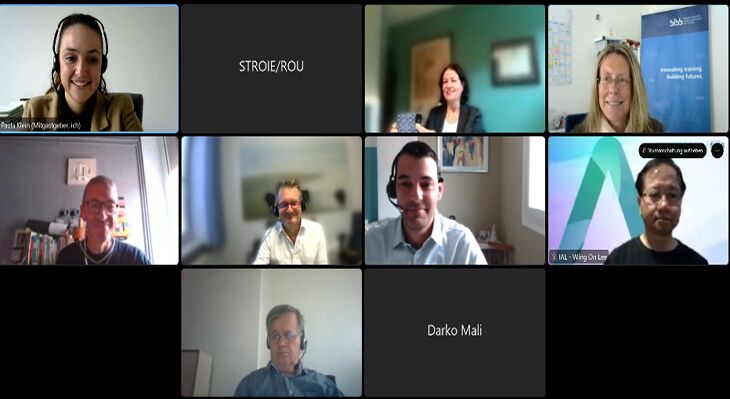The International Expert Monitor on work-based learning in IVET
As part of the International Expert Monitor (IEM)–project, the first virtual workshop “IEM Results, Reflections and the next Round” took place on 12th of October 2022. At the invitation of the Federal Institute for Vocational Education and Training (BIBB) the participating international experts from the IEM-network exchanged their views on the results from the first survey round and actively engaged in shaping the next survey round (round 2) which will start at the end of this year.

The IEM on work-based learning in initial vocational education and training (IVET) is a development project which aims to record in a targeted manner how dualized forms of IVET develop over time within Europe and selected countries outside of Europe. To this end a network of experts are surveyed once a year. The first survey took place between December 2021 and April 2022 and the results of this first round were used as a basis for discussion in the workshop. Altogether 36 countries/ regions were covered by the IEM, including 24 of the EU-27 countries.
The IEM was established to fill a gap in international comparative VET research by applying a narrow definition of dualized forms of IVET. Such a narrow definition allows the comparison of rather similar schemes/ programs across countries which is often difficult with other instruments using wider definitions of work-based learning in VET/ apprenticeship. For this purpose, the survey covers only those forms of initial training that meet all of the following criteria: the program/ scheme 1. is primarily aimed at young people before they enter the labor market; 2. contains an in-company training component of at least 40% (including practical training in schools); 3. is based on a written agreement between the trainee, the employer and/ or the training institution; 4. includes payment/financial compensation; 5. has a duration of at least 2 years; 6. is at/ equals ISCED level 3/ EQF level 3 or higher; and 7. leads to a formal transferable educational qualification.
As the IEM is understood as a living project - in the sense that the participating experts can influence the work of the project – the workshop was planned as a means for the participating experts to influence the survey instrument by suggesting the inclusion of elements/ themes of interest to them/ the wider research community.
Conclusion of the workshop
The discussions revealed that the results surveys can achieve are rather limited, as they are often too general in nature and at times to Eurocentric. It however also confirmed, that these results are still able to identify interesting trends and developments within countries (that can later be explored in more detail). Moreover, the experts agreed that the open questions on challenges, trends and developments were those where an immediate gain in knowledge could be achieved and was considered useful for the own work/ understanding.
There was consensus among the participating experts, that the narrow definition of dualized forms of IVET was useful and the systematic capturing of such programs and their development over time is filling a gap in comparative VET research. It was thus among other things suggested, that the IEM should be used more to cover areas, where not much comparative information exists regarding dualized forms of IVET, as for example the financial subsidisation (for training companies, apprentices etc.), the cooperation between training company and school, the assessment and documentation on in-company training, models of 3rd learning places, training alliances, and governance & capacity building at intermediaries for employer/ companies.